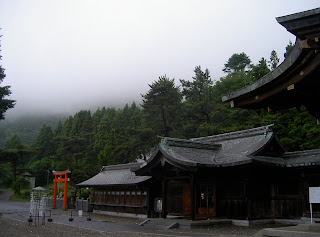A picture of the Moheji station sign taken with my cell phone while I waited for the next train.
I had a great exchange with okaasan the other night-- we were discussing something, I was a little confused, but I think she was trying to tell me that kids with freckles can grow up to be attractive, and she started talking about "roーra" and "meーriー," at which my ears perked. The Little House on the Prairie series was a staple of my childhood, and I didn't miss the reference, despite the somewhat distorted Japanese pronunciations of "Laura" and "Mary." "That family, they traveled across America in a...." I trailed off as my Japanese vocabulary failed to provide me with the word for covered wagon. "Un, un, un!" okaasan confirmed, "Roーra wrote it." I explained to her that it had always been one of my very favorite stories. Very excited, she called Oniisan from upstairs and without hesitation he ran off into another room, rummaged through some boxes, and presented me with six or seven small blue books- the entire series in Japanese. I've been trying to make my way through the first one (大きな森の小さな家, literally, "big forest's little house") every day before bed and on the train, and despite having to look up lots of words like rifle, venison, log and hatchet, the reading level is surprisingly manageable if I go slowly.

On the train yesterday, a little boy, probably about four, got on and walked a few paces before seeing me, staring, and loudly announcing "gaijin da!" ("foreigner!") The Light Fellowship mentioned that this kind of situation might happen, so I was prepared: I responded with a prompt "nihonjin da!" ("Japanese!") and he got a confused look on his before spotting his mother and running off. It was as if he couldn't comprehend the possibility that a Japanese word was coming from my mouth-- it was pretty funny. Later, at the "kyoukai" (which Ialways thought meant church, but okaasan uses to refer to the place where she practices "立正佼成会" Rissho Kosei-kai, apparently an offshoot of Nichren-Buddhism founded in 1938,) a little girl asked, after staring at me for a long time, why my eyes were blue. That one caught me by surprise and I couldn't think of a suitable response.
When we enter the kyoukai, we bow down in the direction of the alter and say our "greetings," before kneeling in a circle with 14 or so other women. First, we chant "namu myou hou ren ge kyou," which my dictionary translates as "Glory to the Sutra," and thank one another and the "sensei" before discussing various things. I say "various things" because usually I have a lot of trouble understanding the conversations due to a combination of slight Hokkaido dialect and the manner of speech of older individuals. The discussion leader, or sensei, starts by asking what we've realized recently and usually people relate long, complicated anecdotes before reaching their points. Last time, though the anecdote was a little confusing, I managed to catch the point: Okada-san thought that Tanaka-san would be upset at her about something (involving missed phone calls?) but she wasn't. Okada-san realized that she only thought this, because she let herself get annoyed at others in the same situation, but the "abundance of Tanaka-san's heart" had brought her attention to this. I've been to the kyoukai a couple times, but I've never quite been able to follow the discussion, so I counted this as a success.
I've also been able to understand otousan more than usual recently, though I can't say if that's more because I'm able to understand his extremely slurred pronunciation (according to okaasan, he doesn't have very many teeth) or because I'm just starting to know what kind of things he tends to say (why don't you turn the lights on? Do you want to drink coke?) and am getting better at guessing.
A few pictures:

Kaiten sushi with okaasan

A picture taken at the cemetery during Obon, a festival to honor the spirits of deceased ancestors.

A nearby shinto shrine I visited recently with my friend Wang-san from class

The priest who sat across from me on the train on the way home yesterday


